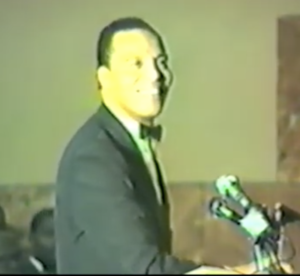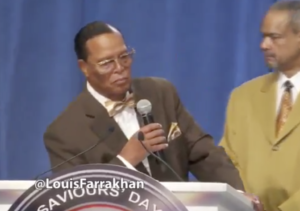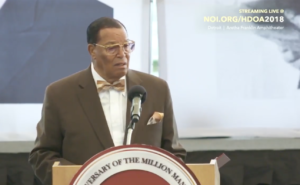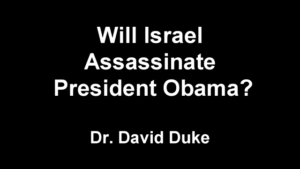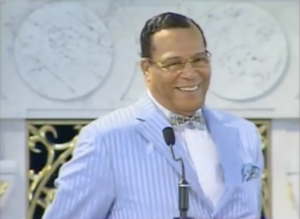Min. Louis Farrakhan on Meet The Press, April 13, 1997
NBC News
MEET THE PRESS
Sunday, Meet the Press: April 13, 1997
GUESTS:
Representative John Kasich, (R-Ohio)
Chairman, Budget Committee, U.S. House of Representatives
Minister Louis Farrakhan
Nation of Islam
MODERATOR/PANELIST: Tim Russert – NBC News
PANEL: David S. Broder – The Washington Post
MR. RUSSERT: Welcome again to MEET THE PRESS. Our issues this Sunday morning: race, rhetoric and responsibility. In his first appearance ever on MEET THE PRESS, the organizer of the Million Man March, the leader of the Nation of Islam, Minister Louis Farrakhan and joining me in the questioning today is David Broder of The Washington Post.
MR. RUSSERT: Coming next, the determined leader of the Nation of Islam, Minister Louis Farrakhan. What does he believe? What is his mission?
MEN. FARRAKHAN: Thank you. Honored to be here.
MR. RUSSERT: Bob Novak heard you speak in Florida recently and wrote a column entitled Farrakhan and the GOP. And he says that, “Farrakhan is knocking on the door of the Republican Party, the first modern black leader to do so. But who will open the door and sit down and talk to him?”
You just heard John Kasich, whom you praised. Jack Kemp last night said it’s impossible to sit down with you because of things you’ve said. Are you trying to reach out and play a role in the Republican Party?
MIN. FARRAKHAN: First, let me say that when men of high political standing say that it is impossible to sit down with Farrakhan because of the things he has said, should I then say, “It is impossible to sit down with white people for the things that they have done”? I speak words, and I believe my words are truth, but what my people have suffered and continue to suffer in America is very real. So if there’s going to be some meeting of the minds, intelligent people should sit down—pardon me — and not give me preconditions, but sit down and talk about the future of this nation and the future of suffering people in America.
MR. RUSSERT: In preparing for this interview I read the literature that your organization puts out and publishes…
MIN. FARRAKHAN: Mm-hmm.
MR. RUSSERT: …and I’d like to go through it to find out what you believe and how it affects America. This is your newspaper, which comes out once a month, and on the back page…
MIN. FARRAKHAN: Once a week.
MR. RUSSERT: Once a week. On the back page is the Muslim program, What the Muslims want. And if I can go through a few of these—let me put one on the screen and get your reaction. The first is in terms of territory, and you’ll see, “Since we cannot get along with them in peace and equality, we believe our contributions to this land and the suffering forced upon us by white America justified our demand for complete separation in a state or territory of our own.” Is that your view in 1997, a separate state for black Americans?
MIN. FARRAKHAN: First, the program starts with number one. That is number four. The first part of that program is that we want freedom, a full and complete freedom. And the second is, we want justice. And we want equal justice under the law, and we want justice applied equally to all, regardless of race or class or color. And the third is that we want equality. We want equal membership in society with the best in civilized society. If we can get that within the political, economic, social system of America, there’s no need for point number four. But if we cannot get along in peace after giving America 400 years of our service and sweat and labor, then, of course, separation would be the solution to our race problem.
MR. RUSSERT: You told The Washington Times a few years ago, “We have no hope that we can effect true reconciliation between blacks and whites in this country. The answer, ultimately, is going to be separation.”
MIN. FARRAKHAN: It appears that way. America right now is faced with the same problem that it faced in the 1860s with Abraham Lincoln. You have a country, a great nation, but it is divided. And so that time it was North and South, and in the middle of that divide was the question, “What are we going to do with slavery?” Today America is suffering the same problem,the racial divide, and in the center of that, what are we going to do about justice for the black and the red and the brown?
MR. RUSSERT: Last year you gave an interview to Henry Louis Gates, a professor from Harvard, in New Yorker magazine where he asked you whether you still subscribe to the teachings of Elijah Mohammed on Yakub, a black scientist who 6,600 years ago created the white man, and that by the end of the 20th century, a spaceship will come and rain down upon white people and people who don’t embrace Islam. Do you subscribe to the teachings of Yakub, that Yakub, the black scientist, created the white man?
MIN. FARRAKHAN: I subscribe to every word that the Honorable Elijah Mohammed taught us. You know, it’s not unreal to believe that white people who genetically cannot produce yellow, brown or black had a black origin. The scholars and scientists of this world agree that the origin of man and mankind started in Africa and that the first parent of the world was black. The Koran says that God created Adam out of black mud and fashioned him into shape. So if white people came from the original people, the black people, what is the process by which you came to life? That is not a silly question. That is a scientific question with a scientific answer. It doesn’t suggest that we are superior or that you are inferior. It suggests, however, that your birth or your origin is from the black people of this earth; superiority and inferiorities determined by our righteousness and not by our color.
MR. RUSSERT: So Yakub, a black scientist, created whites?
MIN. FARRAKHAN: We believe that, yes. John in the Bible, in Patmus, who was on the Isle of Patmus, which is in the Agean Sea, for the word of the Lord, which is to let us make man in the image of the original.
MR. RUSSERT: Elijah Mohammed also said that whites are blue-eyed devils. Do you believe that?
MEN. FARRAKHAN: Well, you have not been saints in the way you have acted toward the darker people of the world and toward even your own people. But in truth, Mr. Russert, any human being who gives themself over to the doing of evil could be considered a devil. And in the Bible, in the Book of Revelations, it talks about the fall of Babylon. And it says Babylon is fallen because she has become the habitation of devils. And we believe that that ancient Babylon is a symbol of a modern Babylon which is America. And in America, America has become a land of people who want to do their own thing, and their own thing is in direct contravention and rebellion against the will of God which makes any rebel against God an agent of Satan.
MR. RUSSERT: Let me go back to the Muslim program. One of the points also is interracial marriage, and well take a look at that on our screen. “We believe that interracial marriage or race mixing should be prohibited.” Is that still your view?
MIN. FARRAKHAN: Our view is that there are at least five or six black women to every black male. The black male is either in prison, in the Armed Forces, in the streets, on drugs. The black woman needs a mate, and if the black man is a suitable mate, I believe I would prefer that he chooses one of his own women. Racial harmony to me does not mean racial mixing. Racial harmony to me means mutual respect of one people for another.
MR. RUSSERT: Can you, as a black man, marry a white woman, or a black woman marry a white man, and still be in good standing in the Nation of Islam?
MIN. FARRAKHAN: The mother of the leader who came to North America to teach us, Farad Mohammed, his mother was a white woman. His father was a black man. So where there is love, love transcends our racial denomination or ethnicity. Love is the great power of transformation. So I don’t think that we can say when two people are in love that they shouldn’t marry one another. But I would prefer that the black man and the black woman marry into their own kind.
MR. RUSSERT: Let me show you two other points quick. One is on the whole idea of prisons, which I found interesting. “We want freedom for all believers of Islam now held in federal prison and also on taxes. We want the government of the United States to exempt our people from all taxation as long as we are deprived of equal justice under the laws of the land.” Anyone who believes in Islam should be freed from federal prison and black Americans should not pay taxes?
MIN. FARRAKHAN: Well, if you look at Islam, Islam is a religion that absolutely reforms and transforms our life. If I might take just a moment to say something about the religion of Islam — while we believe that Christianity and the Judeo-Christian context is the most evangelical of the religions, Islam is the most ecumenical, because in Islam, we believe in Moses and the Torah. We believe in Jesus and the gospel. We believe in all of the prophets and the Scriptures that they brought. So when a person goes to prison who has been deprived of equal justice, and because of the lack of equality of opportunity and the pursuit of happiness, gets involved in social conduct that is against the law, when that person accepts Islam and their life is transformed into that of a righteous person, we believe that a righteous person should be freed from prison. And about taxation, I would respectfully say that some of the Founding Fathers of this great nation said that taxation without representation is tyranny, and as long as we are deprived of equal justice under the law, why should we pay taxes to a system that certainly is not good for us as it is presently structured?
MR. RUSSERT: You are heading to south Philadelphia at the invitation of the mayor of Philadelphia to address an ecumenical meeting, because there had been some racial killings in Philadelphia, both whites and blacks. Jewish organizations refuse to participate. Yesterday, the Catholic Church refused to participate, and they cited some of the things you said in your past. I want to walk through those and find out why they are so offended and your reaction to it. You heard John Kasich talk about love as opposed to hate in your heart. The Catholic Church cited this in my conversations, and I’ll put it on the board. “We just got to tell the truth. Catholicism has been by white people, for white people, to subject black people to a white kind of theology that strips us of ourselves.” That was you in 1994. And they particularly took great offense to Khallid Muhammad, your former chief spokesman, who said, “The old no-good Pope — you know that cracker, somebody needs to raise that dress up and see what’s really under there.” Do you understand why Catholics take offense and believe that you are bigoted towards them?
MIN. FARRAKHAN: Do you understand why black people would be upset that we were brought to America on the slave ships run by Christian — so-called Christians — and while we were being burned at the stake and hung on trees and castrated and dehumanized, the Catholic Church did not speak out on our behalf, nor did the Christian church. And it was three centuries that the Bible was locked against us. If I might respectfully say, Mayor Rendell is Jewish. He invited me to the city. I hope to speak to that condition, and I would hope that the Catholic Church would not fasten on words while we could fasten on deeds. Do you know that the young men who ran out and beat up that young lady in Philadelphia came out of a Catholic Church? The recent incident in Bridgeport in Chicago—those young men were Catholics. I am called a hate teacher, a hate preacher, an anti-Semite, a bigot. And nobody wants to talk with me because it doesn’t appear that I have love in my heart. But look, in the 20 years that I have been the leader of the Nation of Islam there is not one single incident of any Muslim being arrested for a hate crime. Yet, the church is the bastion of love, but all of this hate is coming toward us out of the church. I think it is a mistake that the church won’t be present. I think it is a mistake that members of the synagogue won’t be present. But that is exactly the way it has been. The members of the church abdicate their responsibility to social justice. Something has to be done, and the church has a very important role to play, not only the black church, but the white church as well.
MR. RUSSERT: Do you believe the Catholic church is anti-black and the pope is a no-good cracker?
MIN. FARRAKHAN: I don’t use that cheap language. I don’t like that. And the honorable Elijah Muhammad also did not subscribe to that kind of language. I do believe, however, that white Eurocentric supremacy has been placed on religion, and that’s why in most of the black churches and in some Catholic churches today they have replaced the image of a white Jesus with a black Jesus. And out of Christianity is coming a black theology because they recognize that white supremacy has permeated Christianity and particularly Catholicism.
MR. RUSSERT: Your comments about Jews — and they also are refusing to participate in this meeting — are widely reported; the reference to it as a dirty religion. I went and reviewed what you said and I went back and I watched your speech from 1995. And I’d like to play just a piece of that for you to explain exactly what you meant.
MIN. FARRAKHAN: Sure.
MR. RUSSERT: And let’s roll the tape, if we can.
(Videotape, March 19, 1995): MIN. FARRAKHAN: German Jews financed Hitler right here in America: Loeb and Kuhn and Jacob Schiff. International bankers financed Hitler, and poor Jews died while big Jews were at the root of what you call the Holocaust. Why don’t you tell that one? Little Jews dying while big Jews made money. Little Jews being turned into soap while big Jews washed themselves with it. Jews playing violin. Jews playing music while other Jews marching into the gas chambers.
(End videotape)
MR. RUSSERT: Now, if you were a Jewish American watching that, your reference to “what you call the Holocaust,” suggesting whether there was a Holocaust, and the whole reference to big Jews and little Jews and the emphasis you use, why wouldn’t you say that’s anti-Semitic?
MIN. FARRAKHAN: The question is: Is it truth? If it is truth, then it is not anti-Semitic, it is truth. My problem with the Jewish community is that most of the Jewish people feel that if you criticize any act of Jews, that is anti-Semitic. If I criticize Arabs, if I criticize the government of the United States, if I criticize white people or my own black people, I’m not considered anti-black, anti-Arab. Why should anybody who criticizes Jewish behavior that ill affects black people and their pursuit of happiness be considered anti-Semitic? Last week Orthodox Jews made the statement that reform and conservative Jews are off the page of Judaism. I saw it not in The New York Times, but I saw it in the Chicago papers, just a little writing. But nobody called them anti-Semitic. But if I said that reformed Jews or conservative Jews are those that do not follow the laws, commandments and statutes given by God to the prophets of Israel are not really Jews, then I’m considered anti-Semitic. I am not anti-Semitic. I do not hate Jewish people. I hate actions of any people, including my own, that are evil and are obstructive to justice, freedom and equity.
MR. RUSSERT: Do you believe there was a Holocaust in which six million Jews perished?
MIN. FARRAKHAN: Of course I believe that Jews perished in Germany, and the same Jews that perished in Germany while the Pope Pius XII looked the other way and the government of America looked the other way. Now, there is reconciliation between Jews and Catholics, and the government of the United States. What is wrong with reconciliation between those who looked the other way when my fathers were being brought into America as slaves, and to this very moment have not received justice? I think atonement, reconciliation and responsibility should be the watchword for this time, and I am willing to sit down with any who wish to discuss atonement, reconciliation and responsibility.
MR. RUSSERT: Would you be willing to retract or apologize for some of the things you’ve said?
MIN. FARRAKHAN: If, in any dialogue, I can be shown to be in error, I would most surely apologize. But you cannot put me off in a corner and not dialogue with me and then say to me, “Farrakhan speaks words that are hateful.” If I can defend every word that I speak, and every word that I speak is truth, then I have nothing to apologize for. But if, in a dialogue, you can show me where I am in error, I am not a proud man. I will humble myself and go before the world and apologize. But now the burden is, will you show me where I am wrong?
MR. RUSSERT: I went up on the Internet last night, www.noi — Nation of Islam — org and found that With the an essay written by one of your followers, and it said the following: “The Jews’ awesome control over American society and government; all presidents since Franklin Roosevelt, 1932, are controlled by Jews.” Do you believe that?
MIN. FARRAKHAN: I believe that, for the small numbers of Jewish people in the United States, they exercise a tremendous amount of influence on the affairs of government. Right now there is a tremendous problem in the Middle East, a very grave problem. I do not think that President Clinton is handling his role in the most responsible manner. As you know, East Jerusalem was under Palestinian control until the year 1967. After the Six-Day War, it was annexed by Israel. It is part of ongoing negotiations. Now, for Netanyahu to say he wishes to build now in East Jerusalem, and the world says he shouldn’t do this, and since he said he would build and started moving on that, violence has erupted, and the peace process has been brought to a halt. Mr. Clinton, instead of exercising the strength of a man whose country contributes at least $4 billion every year to the state of Israel, America has influence in Israel, but is not using that influence in a constructive way, but rather pays lip service to the Palestinians while she bows to the dictates of Netanyahu and the strong political Jewish lobby.
MR. RUSSERT: Mr. Farrakhan, you seem to be suggesting that what you told Henry Louis Gates in New York — or you still believe there’s a small Jewish cabal that meets on Park Avenue or Hollywood and tries to shape our culture.
MIN. FARRAKHAN: I don’t know why you would put that on me. I was quoting a Jewish movie producer in Jamaica, producing the movie “Lost In the Stars,” and it was that Jewish producer who told me this. I didn’t ask him. He mentioned this to me.
MR. RUSSERT: But this is what you said, sir: “Who controls black art? Who controls black sports figures? Who controls black intellectuals, black politicians? When I talk to the Jews, I’m talking to a segment of that quorum that holds my people in their grip.”
MIN. FARRAKHAN: And that is true. Who controls the movement of the NAACP? The Urban League? Who controls black politicians?
MR. RUSSERT: Who does?
MIN. FARRAKHAN: Why is it that when I go before our brothers in quiet they can say good things about me. But when they fear of the Jewish reaction to any kind word — look at Mr. Novak. Look at — he just said a few kind words about my work, and look at the kind of brickbats he has received. Mayor Rendell invited me to Philadelphia, and look at the brickbats he’s receiving from his own people. Yes, they exercise extraordinary control, and black people will never be free in this country until they are free of that kind of control. And I do intend by the help of God to break up that control so that when a new relationship is structured, it is structured on the basis of equity and reciprocity. We cannot allow ourselves to be controlled by any outside group. We must take control of our own destiny. That is what I preach, and that is what I believe, and that is what I’m striving for.
MR. RUSSERT: We have to take a very quick break. We’ll be right back with more of our interview with Minister Louis Farrakahn of the Nation of Islam right after this.
(Announcements)
MR. RUSSERT: We’re back on MEET THE PRESS with the leader of the Nation of Islam, Minister Louis Farrakhan. Our next question is from David Broder.
MR. BRODER: Mr. Farrakhan, President Clinton has said that if the United States determines that a foreign government had a part in the attack on the Saudi U.S. barracks in Saudi Arabia, where 19 Americans were killed, that we will retaliate against that country. My paper reports today that there is now evidence that Iran was perhaps linked to that attack. Would we be justified in retaliating?
MIN. FARRAKHAN: You know, Libya was bombed under the Reagan administration, under the alleged bombing of a discotheque in Germany where three people lost — three American soldiers lost their lives. It has since come out that Libya was not responsible for that bombing, yet Reagan ordered the most expensive assassination attempt in the history of the world. Now, America has also in the beginning — when Pan Am 103 was downed, America said it was Syria. It was possibly Iranian, but Libya was not mentioned. A few years later it became a Libyan-sponsored terrorist act to justify the continued embargo on Libya. Now, America sees Iran, an Islamic republic, as a serious threat. Recently Congress voted $20 million more for covert operations against Iran. It is feared — America fears the rise of Islam, those in government. And so now they’re hinting that there may be some Iranian involvement in this bombing. America shot down an Iranian plane with over 300 Iranians. America has not even apologized to Iran or offered compensation. Now, she talks about wanting to retaliate? What kind of retaliation? It is this kind of sick foreign policy objectives of our government that will bring her ultimately to her ruin.
MR. BRODER: Your travel to some of those countries, including Libya, where you were quoted as describing Mr. Qaddafi as a freedom fighter, has drawn a great deal of criticism. Let me ask you this. I came across a clipping of a speech — actually, a transcript of a speech — that you made here in Washington just about a year ago at the National Press Club where you said, “As a Muslim, I cannot pledge allegiance to the flag. My allegiance is to God.” We all know the words of the Pledge of Allegiance. I wonder what it is in those words that you find impossible to say.
MIN. FARRAKHAN: “Liberty and justice for all” is one. And as a Muslim, I cannot give my all to the symbol of a government, no matter what that government is. As a Muslim, I give my allegiance only to God. And I submit to the laws that govern this land, as long as those laws do not conflict with my religion. That is a basic principle of my belief, and there are many American citizens who subscribe to faiths other than Islam who will not pledge allegiance to the flag. I will never disrespect that flag. I don’t agree with flag burnings. I don’t agree with draping the flag of an independent and sovereign nation over toilets. I don’t believe in anyone not respecting the flag of this sovereign nation. And whenever “The Star Spangled Banner” is played, even though I will not pledge allegiance, I stand in respect. That is the best that I can give to the flag, is respect.
MR. BRODER: You told Mr. Russert that your goal is to “break up the kind of control” that you say…
MIN. FARRAKHAN: Yes.
MR. BRODER: …Jews now exert over black people in this country.
MIN. FARRAKHAN: Yes.
MR. BRODER: By what means do you intend to break up that control?
MIN. FARRAKHAN: To continue to point out the truth of that control, and how that control never will allow us to be full and completely men, free, justified and equal. Why should we be controlled by the power, influence and money of others? We should not be under that kind of control which limits us and makes us act like little boys going to Jewish philanthropists, begging them for money to support our causes, and through that money, there is control. And that kind of control limits the freedom of our people to speak freely, write freely, think freely and act as free men. And it is that that I oppose, and I shall continue to oppose that until our people are completely free.
MR. BRODER: The country, as you know, is riveted this weekend by the extraordinary spectacle of Tiger Woods, this 21-year-old black man, who is setting a course on a once-segregated golf course in Georgia; that has won the admiration, apparently, of all of his fellow professionals, most of them white, of course. Do you think that he is somehow in the control of a group of Jews or other people, or what does that represent to you?
NUN. FARRAKHAN: I’m not familiar with Tiger Woods’ management, agents and all of the things that go into…
MR. BRODER: Well, suppose he had a black man—I mean, had a Jewish manager? What would that…
MIN. FARRAKHAN: I’m not saying that that’s bad. I’m saying that the way black entertainers and sports figures are handled, they are nothing more than glorified pieces of meat.
MR. BRODER: Is that how you see Tiger Woods?
MIN. FARRAKHAN: I don’t know Tiger Woods. I’m proud of his work. I’m proud of his accomplishments. He is a giant in his field, as most of our sports figures are. But what I’m concerned with, Mr. Broder is, you know, America glorifies sports and entertainment figures who are black. Where are our scientists? Our doctors? Our scholars? Our people who add to the development of civilization rather than glorifying only those who embellish the civilization through art? And then, of course, the degenerate culture that is coming from some of our artists — I am angry at that. And Time Warner and those fellows who have our rap artists and promote this degenerate language, this filthy speech, this gangster talk, they have to accept some responsibility for this, and this is wrong. And I will continue to speak out against it.
MR. BRODER: I attended the Million Man March and, like many others, was impressed by the turnout there. What sort of political leverage do you think that that has given black people or yourself in particular?
MIN. FARRAKHAN: In the last election, those who studied the election said that 1.7 million black males, more than before, voted in this election. It says that blacks heard our message, they responded to our message. And we hope to organize and mobilize black people so that we can become an economic and political force in the landscape of America.
MR. RUSSERT: Black Americans voted overwhelmingly, nine out of 10, for Bill Clinton.
MIN. FARRAKHAN: Yes.
MR. RUSSERT: Is that a good thing?
MIN. FARRAKHAN: No, it is not. I feel that our people, who were once Republicans, were very loyal to the Republican Party because of what Abraham Lincoln did. When Franklin Delano Roosevelt came up with the New Deal during the Depression and black folk found in him a person who was sensitive to the needs of the poor, they left the Republican Party and became Democrats. Now, black people are taken for granted in the Democratic Party and not even sought after in the Republican Party. But there is a substantial vote that must not be taken for granted by either party, and we hope to break up that as well.
MR. RUSSERT: We have just 10 seconds. What do you think of the teaching of Ebonics to black students in schools across America?
MIN. FARRAKHAN: I think that we always have had a way of expressing ourselves that is, at home, different. But I think we must learn the language and speak the language well in order to communicate our ideas properly.
MR. RUSSERT: Minister Louis Farrakhan, we thank you very much for joining us this morning and sharing your views with us.
MIN. FARRAKHAN: Thank you for the honor of being on MEET THE PRESS.
Copyright (c) MSNBC, Inc. All rights reserved.

